
by Michael | Jul 9, 2018 | Blog
Weddings and public speaking go together. And stage-fright is often an (unwelcome) part of the process.
In fact, according to statistics, many people fear delivering a speech more than they fear death!
The likelihood is that you will be called upon to write and deliver a speech at least some time in your life. It may be for a business presentation or else for a family event. It could be in front of a handful of people or before a whole crowd. However, it is a skill that is well worth mastering.
My story
Only a few years ago, I needed persuasion before I would even enter a room to network. After a while, I became more comfortable. Then I was persuaded to give a 10-15 minute presentation about my business in front of 18 people. That was a step too far! I was so nervous that I gestured wildly and shattered a glass of water. I became memorable, but not at all for the right reasons!
Now, I willingly and confidently address small crowds (I haven’t got to the 1000s stage, but I hope that may happen). Recently, I was put in front of 200 guests at the Savoy, and it wasn’t an issue. Indeed, as a civil celebrant, my success depends, at least in part, on my presentation skills.
I’d therefore like to pass on knowledge and tips that I have acquired, so that the potential ordeal of public speaking can become much more palatable.
Focus
I am going to concentrate here on celebratory-type ceremonies. Essentially, we will need to focus on content and delivery. Here are some thoughts as a starting-point.
Tips
- It is better to be brief than over-long – your audience may be hot, tired, hungry
- If you can deliver humour successfully, do so; if not, keep those jokes to a minimum!
- Avoid too many “in-references” – at a wedding half the guests may not know anything about one of the newly-weds, so in-jokes can fall very flat and exclude whole groups
- Use a script or, better still, numbered 3 x 5″ cards. (Only very accomplished, experienced speakers can deliver off the cuff). Rehearse so that you can deliver your speech with only occasional reference to your notes. Eye contact with your audience is very important, if you are to engage with them
- There may be a good sound system, but ensure you can be heard loudly and clearly – you can help that by not burying your head in your notes and by speaking s-l-o-w-l-y ( a lot slower than you may expect!)
- Avoid saying anything controversial, whether about personalities in the room or about politics – the idea of the proceedings is to create a wonderful atmosphere, not to score points!
- Use anecdotes, but ones that fit in and are relevant. Avoid meandering ‘shaggy dog’ stories that may lose your audience. If you are not good at crafting a good story, maybe you can get someone to help you
- Delivery should be slower, rather than faster, and do not be afraid of a silence, if appropriate. Try not to address one area of the room only, but make everyone feel included
If you need any more advice, then there are professional presenters out there who can help. And I would be happy to help too.
Remember that it is a privilege to be asked to give a speech, so be grateful. Remember your audience at all times. Oh, and, however nervous you may be, save the alcohol for afterwards!
Enjoy the occasion.
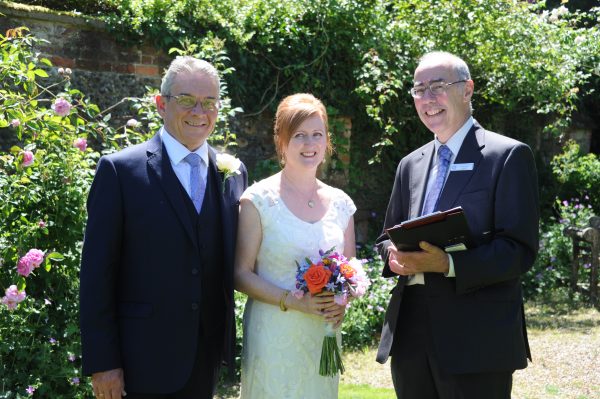
by Michael | Jul 2, 2018 | Blog
It was great! Last weekend I conducted an outdoor ceremony. And during the week too. And my next ceremony is due to be outdoors too.
It’s been a fabulous summer (so far), so it makes perfect sense. But let’s change tack slightly. What about a winter outdoor ceremony?
Hold your horses (or reindeer?), I hear you say. Who’d have a wedding or vow renewal in the open in the UK in the winter?

Well, I agree that it’s a huge gamble. (It can be a huge gamble in the summer too, of course!) Nobody relishes sitting through a wet, cold ceremony. But just imagine if you get one of those crisp, snowy days, with a blue sky. What could be more magical?
If you’re thinking of going for it, there are some ways of harnessing the climate to your advantage; you can also lessen its (negative) impact. So here’s what I, from my experience as a professional civil celebrant, suggest.
The Weather
Once you’ve taken the plunge (sorry about the pun!), then the decision is made and you simply have to make the best of it.
Two nice touches you could adopt are:
- Issue blankets (whether in themed colours or not) to guests
- When the guests arrive at the reception, rather than ice-cold champagne, why not offer them hot chocolate or mulled wine?
Make the Weather your Theme
You can use snowy scenes as background for your wedding invitations, RSVP cards, and, on the day, for the place cards.
Table decoration could include pine cones, foliage and lots of white. If it is likely to be snowy weather, plain white can work very well for the colour scheme.
You might even replace flowers (which, being out of season locally, can be costly) with pine cone bouquets, which are attractive as well as rather original.
Candles or tea lights may be a good idea, but you will have to take good old health and safety into account – people need to be able to see where they’re going and you don’t want fires breaking out, either! Also bear in mind that exposure to the elements may cause candles to be blown out or even to fall over!
Seasonal Colour
If you are having white as your themed colour, this may allow you to choose strong colours for bridesmaids, which could look very striking.
You can style the wedding cake with festive red and white.
The Garden
It can be a lot cheaper to use your garden for the wedding, rather than hiring a venue, and it may have, well, a homely feel about it, which can be charming. However, you might save less money than you think, and you risk missing out on that valuable peace of mind that dealing with professionals should afford.
You’ll have to make suitable arrangements for tables, chairs, toilets, parking, catering, place settings and electricity. Then you will need to offer protection from the elements, possibly providing blankets, as already suggested, and even umbrellas.
So, yes, an outdoor winter ceremony is a dangerous gamble, but the rewards can be so worthwhile …!
Just contact me for further information.
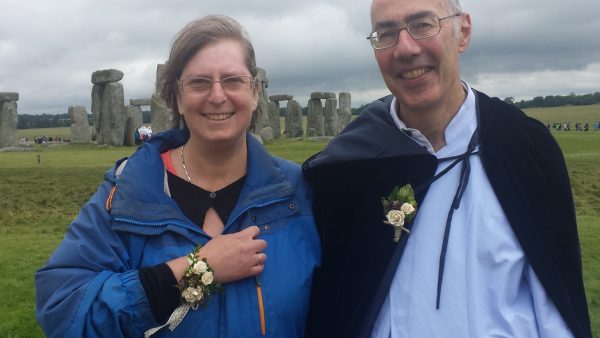
by Michael | Jun 25, 2018 | Blog
The proposal is over and done with. You’re engaged! What an exciting time! Congratulations!
Of course, this is a wonderful period. You’re walking on air. But maybe I can bring you down to earth just a little. There are some questions you need to consider.
Are you going to name the day now? What sort of ceremony will you have? What about the reception? Where will it be? Who will you invite?
And so it goes on …
That’s reality, I’m afraid!
First things first
If you’re opting for a full-religious ceremony, then your church/synagogue/mosque etc. will give you the information you will need.
If you’re not so sure you want to go down this route, then it’s worth reading on. Because you do have choices.
Options
There’s a register office wedding. That covers the legal bits. However, the ceremony is, frankly, not particularly special. The service (apart from the names used) will be the same from one couple to the next. You can feel part of a ‘conveyor-belt’.
Better than this is what a civil celebrant offers. He will create and conduct a tailor-made ceremony for you. You’ll still need to go to the register office with two witnesses to get the legal bits done before the civil ceremony. (This can happen the morning before, or a couple of days before.)
If you prefer, and you’re using a licensed premises, the registrars can be booked. They’ll come along, and, as soon as they have legally married you, you can proceed with the (celebrant-led) ceremony of your choice.
Advantages
One advantage of a civil ceremony is that you can have a service that is as religious – or not – as you want. Or – and this is great for people who are not marrying someone of the same faith – you can have a mixed religious ceremony. So, for example, I’ve been able to marry a Jew and a Christian, a Jewess and a Muslim and even a half-Jew and a pagan. We’ve been able to incorporate elements from both cultures each time, so everyone was happy.
The full-religious and, indeed, the Register Office, ceremonies follow a set pattern. However, with a (bespoke) celebrant-led ceremony, you can set your individual stamp on the proceedings.
Following a chat with your celebrant, who can suggest to you what is possible and guide you, you can work out a ceremony that reflects your personalities and beliefs, and will be everything you want it to be.
That means you have input into, and editorial control over, everything. You decide on the texts/poems/reading, reciting of vows, who actually participates, music, rituals etc. That’s what I mean by “tailor-made”. The ceremony will be unique: unforgettable for you and your guests; relevant and meaningful.
I can gladly give you more information. Just call or e-mail. This can be an excellent starting point for you, now that you’re engaged. Let me help you successfully tread the exhilarating road that leads to marriage.
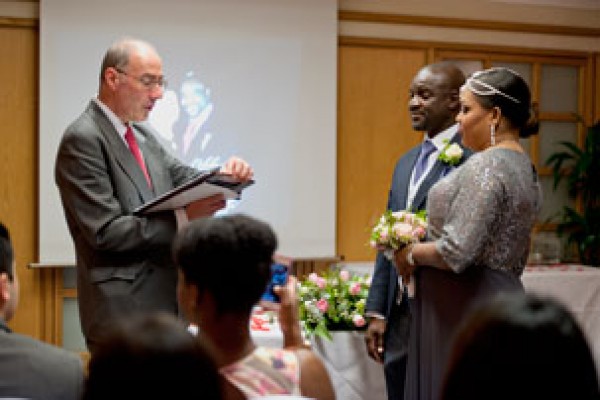
by Michael | Jun 18, 2018 | Blog
OK, I’m think Vow Renewals are a delight. But why, actually, should anyone even consider renewing their vows?
Well, I’m a civil celebrant, so I have to conduct them and happen to love them. However, that response may not help you if you’re seeking justification!
I therefore suggest these (hopefully, more compelling!) reasons.
Why renew vows?
34% of marriages end in divorce and 33% of them end before 10 years, so there’s every reason to celebrate staying together. People often look at 10, 15, or other multiples of 5 years as good times to celebrate.
You don’t need to renew your marriage just because there’s a five or zero at the end of your anniversary. Renewing your vows can mark significant moments in your lives. These could be the birth of a baby, or coming out the other side of a difficult marital patch or illness. Maybe family and friends missed the original wedding because it took place abroad.
What is a Vow Renewal ceremony?
Of course, the ceremony is a public declaration of love between two people. It can be in front of 200 people, or it can be a tiny, informal affair for just a handful of guests. The venue can be virtually anywhere and you have total control over how big – or small – any reception may be.
The Vow Renewal ceremonies I conduct tend to be modest, but very beautiful. There may be religious content or not, or a mixture. When putting the ceremony together, I suggest readings and poems (and, where required, prayers) that are spiritual, meaningful and memorable. All are subject to the clients’ wishes.
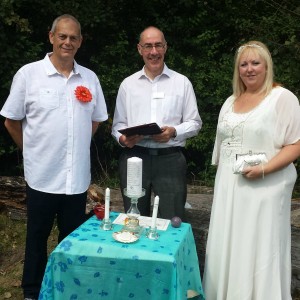
Vows
A focal point is usually the vows themselves. These can be written by the couple, and are often very moving. I always offer guidance on writing these, as many people find the prospect daunting. If they prefer it, I can suggest vows for them.
Quite often, people want their rings blessed, which is another moving part of the ceremony.
Check list
You’ll need to consider the following when planning your Vow Renewal:
- Venue: you don’t need to be restricted (except by budget and legality!). So you can have the ceremony in your garden, at the top of the London Eye, in a luxurious hotel, in a park or on a bridge. Or maybe at the place where you originally tied the knot.
- Invitations: you can invite whoever you want to participate in the ceremony. Maybe you have children – why not ask them to take part? The size of the guest-list is entirely down to you.
- Dress: again, up to you (although make sure you communicate your preferences to your celebrant and guests, to avoid potential embarrassment!)
- Music: you may want to use the music that you heard at your wedding; you may want a relative (preferably with a great voice!) to do a solo; you may want to play a tune that means something very special to you both; you may want nothing – again, the choice is all yours.
- Photographer: you’ll want to capture the moment for posterity, so give some thought to hiring a good photographer (see my dedicated blog )
- Catering: even if you’re having a modest ceremony, some champagne (or equivalent) and a snack go will down well afterwards.
- Other possibilities, like a reception, may be taken into consideration too.
The Beauty of Freedom
The joy of renewing your vows is that you have such freedom to arrange the ceremony as you want. You can tell the world that you love your spouse and your spouse loves you. You don’t have to wait fifty years – you can do it when you’re ready. You can spend as much or as little as you want. You can involve whoever you want. It’s such a happy event.
I hope I’ve managed to convince you!
I would love to help you. Just phone or e-mail me.
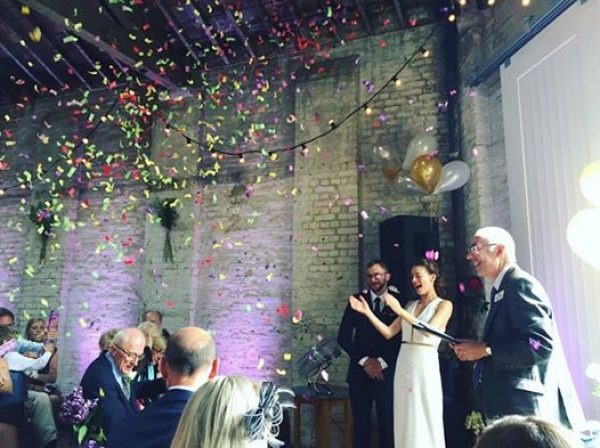
by Michael | Jun 11, 2018 | Blog
Most of the bride and groom’s big day will go past in a whirl. They will be the centre of attention. It’s wonderful – but they may feel bewildered at times. They – and others, notably family members – may well feel under considerable stress.
Obviously, the main protagonists (at least) should be enjoying themselves. However, all concerned may need to make a special effort to show common sense and good manners.
Patience is a particular virtue at such a time (as is a sense of humour). Not least when it comes to the in-laws (or, indeed, your own family).
As a civil celebrant myself, I have to point out that the celebrant should be able to play a role in smoothing the way much of the time, but not everything will be within their control!
Bride
- Getting drunk is not a good idea! Apart from the unfavourable impression this may make on the new in-laws, you may not be able to fulfil the roles you are undertaking. It’s also worth pointing out that lots of people will be taking photos. You don’t want compromising snaps to haunt you in later life!
- Try and make sure you speak to all your wedding guests (they have come to support you, after all). It may mean you miss out on some of the food and drink, but you should acknowledge that people have put themselves out to be part of your celebrations.
Bridegroom
- Much of the stress in the run-up to the wedding day is borne by the bride. Do what you can, especially on the day, to share the load.
- Be punctual – arrive between 30 and 60 minutes before the ceremony.
- Don’t hide away with your mates; meet and make conversation with your new wife’s friends and even relatives.
- Don’t get rolling drunk! You have a speech to deliver effectively and the comments I aimed at the bride apply to you just as much.
Sometimes, just a little thought and consideration will be all that is needed to avert a melt-down. Then your wedding can be the fabulous event you have been dreaming of.
To gain the reassurance of professional support, talk to Michael about being your celebrant!

by Michael | Jun 11, 2018 | Blog
It won’t astonish anybody reading this if I state that marriage costs are steep! However, if you are just drawing up a budget, you may not realise that there are areas where you can cut a few corners.
“Guides for Brides” published the results of a recent survey. 7,500 brides were questioned during 2017, and these are some of the conclusions:
When and how
As you’d probably imagine, most weddings (60%) took place on a Saturday. Friday (at 23%) took the runner-up berth.
You might expect that most people chose to marry in a church (or other religious building). In fact, the majority (65%) chose a civil ceremony, with only 35% opting for full religious. Interestingly, 27.5% chose an unusual location – although I’m not sure what was defined as “unusual”!
Individual Items
Without being exhaustive – for example, this doesn’t take into account hairdressing/make-up, the reception and entertainment or wedding transport as individual items – some major areas of expenditure are as follows:
- the venue – probably one of your major outlays. The average cost of this was £4,450.
- the wedding dress – this could cost around £2,000, with suits coming in at £585.
- the wedding cake: £245
- flowers: £960
- honeymoon: £2,900
Budgeting and Saving
The total average budget, according to this survey, was £16,500. Some 84 guests attended weddings held during the day, and 120 in the evening.
Obviously, these figures only represent a guide. Everybody’s options and requirements are different. The prices will not remain constant.
As I indicated, by no means every expense is covered here. As a civil celebrant, I ought to point out that we have not mentioned registrars or celebrants. Both services need to be paid for! You may choose to employ a wedding planner, and they don’t come cheap.
So, by all means use this information as a starting point, but do your homework thoroughly. There are a variety of ways to reduce costs. Venues have wildly fluctuating prices, and they do not all offer the same facilities. You might hold your wedding in your garden rather than booking a venue at all.
You can choose to marry during the day – that is usually cheaper. The same applies if you avoid the most popular days (Saturday and Friday). You may prefer a buffet to silver service (or cater yourself), and that may save some expense. Offer a cash bar after providing a drink with canapés and a bottle of wine or two for the table to share. Omit canapés altogether, if you want!
You can be quite creative – and still offer a wonderful experience.
So now you’ve got some ideas, plan carefully. Then let yourself loose on those suppliers and go for the ceremony that YOU want. And if you need any more advice, just let me know!








